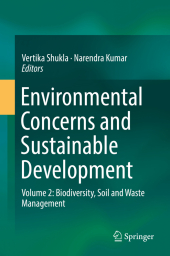 Neuerscheinungen 2019Stand: 2020-02-01 |
Schnellsuche
ISBN/Stichwort/Autor
|
Herderstraße 10
10625 Berlin
Tel.: 030 315 714 16
Fax 030 315 714 14
info@buchspektrum.de |

Narendra Kumar, Vertika Shukla
(Beteiligte)
Environmental Concerns and Sustainable Development
Volume 2: Biodiversity, Soil and Waste Management
Herausgegeben von Shukla, Vertika; Kumar, Narendra
1st ed. 2020. 2019. xiv, 427 S. 40 SW-Abb., 36 Farbabb., 15 Farbtabellen. 235 mm
Verlag/Jahr: SPRINGER, BERLIN; SPRINGER SINGAPORE; SPRINGER 2019
ISBN: 9811363579 (9811363579)
Neue ISBN: 978-9811363573 (9789811363573)
Preis und Lieferzeit: Bitte klicken
The current global environmental crisis is primarily the result of non-standardized parameters for environmental regulation, and is impacting e.g. clean air, safe drinking water and the quality of food, particularly in developing nations. Due to their poor/lax execution of EIA protocols, newly developing countries are preferred destinations for establishing pollution-emitting industries, which results in the degradation and depletion of their natural resources. Lack of environmental policy intervention is another major incentive to base "dirty" industries in these nations.
In order to ensure sustainable development, the highest-priority issues include the monitoring and eradication of environmental problems stemming from economic development; virtually every form of economic development primarily results in the loss of forests and thus biodiversity, followed by declining air quality and the contamination of natural resources.
Sustainable development ensures responsible interactions with the environment, so as to minimize the depletion or degradation of natural resources and preserve environmental quality. It involves integrated approaches to understanding the importance of environmental management systems and policy measures that lead to improved environmental performance.
This book addresses the environmental concerns associated with economic development, and with approaches to attaining sustainable economic development, which include monitoring the quality of water resources, soil erosion and degradation of the natural environment.
Chapter 1: Threats and conservation strategies for overlooked organisms: the case of epiphytic lichens.- Chapter 2: Biodiversity and Therapeutic Potential of Medicinal Plants.- Chapter 3: Tree ferns and giant ferns in India: Significance and Conservation.- Chapter 4: Status of medicinal plants in context of Arunachal Pradesh, India.- Chapter 5: Nutrient Enrichment in Lake Ecosystem and its Effects on Algae and Macrophytes.- Chapter 6: Land-use change as a disturbance regime.- Chapter 7: Floristic diversity, distribution and conservation status in the vicinity of coal mines of Kachchh district in Gujarat, India.- Chapter 8: Sodic Soil: Management and reclamation Strategies.- Chapter 9: Microbe based inoculants: role in next green revolution.- Chapter 10: Environmental Significance of Lichens and Biodeterioration.- Chapter 11: Soil reclamation of saline and sodic soil through phytoremediation.- Chapter 12: Soil pollution by Fluoride in India: Distribution, Chemistry and analytical methods.- Chapter 13: Multielement analysis using ED-XRF and ICP-MS from Couroupita guianensis for sustainable agriculture by soil reclamation.- Chapter 14: Waste Management: A Paradigm Shift.- Chapter 15: Recycling of agriculture waste into efficient adsorbent.- Chapter 16: Environmental hazards and management of e-waste.- Chapter 17: Green House Gas Emissions from Municipal Solid Waste Management Practice.- Chapter 18: Introduction to fast fashion: Environmental Concerns and Sustainability Measurements


